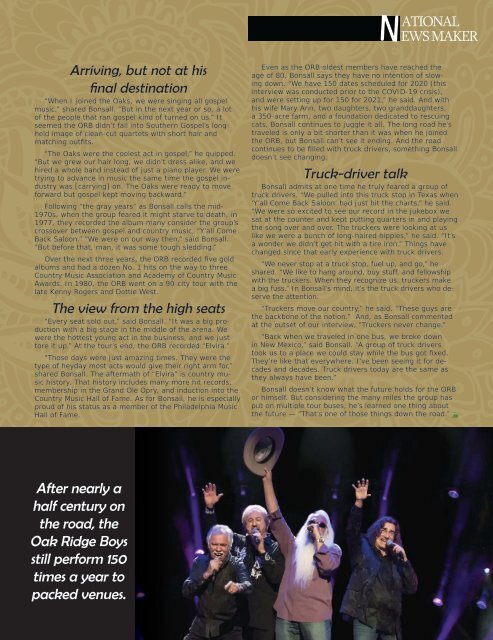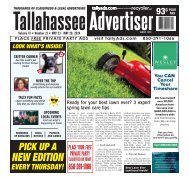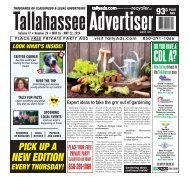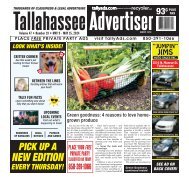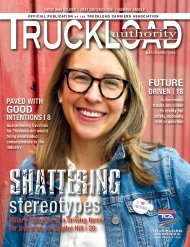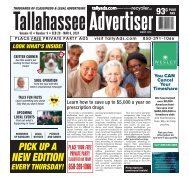TLA42_AllPages
Create successful ePaper yourself
Turn your PDF publications into a flip-book with our unique Google optimized e-Paper software.
Arriving, but not at his<br />
final destination<br />
“When I joined the Oaks, we were singing all gospel<br />
music,” shared Bonsall. “But in the next year or so, a lot<br />
of the people that ran gospel kind of turned on us.” It<br />
seemed the ORB didn’t fall into Southern Gospel’s longheld<br />
image of clean-cut quartets with short hair and<br />
matching outfits.<br />
“The Oaks were the coolest act in gospel,” he quipped.<br />
“But we grew our hair long, we didn’t dress alike, and we<br />
hired a whole band instead of just a piano player. We were<br />
trying to advance in music the same time the gospel industry<br />
was [carrying] on. The Oaks were ready to move<br />
forward but gospel kept moving backward.”<br />
Following “the gray years” as Bonsall calls the mid-<br />
1970s, when the group feared it might starve to death, in<br />
1977, they recorded the album many consider the group’s<br />
crossover between gospel and country music, “Y’all Come<br />
Back Saloon.” “We were on our way then,” said Bonsall.<br />
“But before that, man, it was some tough sledding.”<br />
Over the next three years, the ORB recorded five gold<br />
albums and had a dozen No. 1 hits on the way to three<br />
Country Music Association and Academy of Country Music<br />
Awards. In 1980, the ORB went on a 90-city tour with the<br />
late Kenny Rogers and Dottie West.<br />
The view from the high seats<br />
“Every seat sold out,” said Bonsall. “It was a big production<br />
with a big stage in the middle of the arena. We<br />
were the hottest young act in the business, and we just<br />
tore it up.” At the tour’s end, the ORB recorded “Elvira.”<br />
“Those days were just amazing times. They were the<br />
type of heyday most acts would give their right arm for,”<br />
shared Bonsall. The aftermath of “Elvira” is country music<br />
history. That history includes many more hit records,<br />
membership in the Grand Ole Opry, and induction into the<br />
Country Music Hall of Fame. As for Bonsall, he is especially<br />
proud of his status as a member of the Philadelphia Music<br />
Hall of Fame.<br />
Even as the ORB oldest members have reached the<br />
age of 80, Bonsall says they have no intention of slowing<br />
down. “We have 150 dates scheduled for 2020 (this<br />
interview was conducted prior to the COVID-19 crisis),<br />
and were setting up for 150 for 2021,” he said. And with<br />
his wife Mary Ann, two daughters, two granddaughters,<br />
a 350-acre farm, and a foundation dedicated to rescuing<br />
cats, Bonsall continues to juggle it all. The long road he’s<br />
traveled is only a bit shorter than it was when he joined<br />
the ORB, but Bonsall can’t see it ending. And the road<br />
continues to be filled with truck drivers, something Bonsall<br />
doesn’t see changing.<br />
Truck-driver talk<br />
Bonsall admits at one time he truly feared a group of<br />
truck drivers. “We pulled into this truck stop in Texas when<br />
‘Y’all Come Back Saloon’ had just hit the charts,” he said.<br />
“We were so excited to see our record in the jukebox we<br />
sat at the counter and kept putting quarters in and playing<br />
the song over and over. The truckers were looking at us<br />
like we were a bunch of long-haired hippies,” he said. “It’s<br />
a wonder we didn’t get hit with a tire iron.” Things have<br />
changed since that early experience with truck drivers.<br />
“We never stop at a truck stop, fuel up, and go,” he<br />
shared. “We like to hang around, buy stuff, and fellowship<br />
with the truckers. When they recognize us, truckers make<br />
a big fuss.” In Bonsall’s mind, it’s the truck drivers who deserve<br />
the attention.<br />
“Truckers move our country,” he said. “These guys are<br />
the backbone of the nation.” And, as Bonsall commented<br />
at the outset of our interview, “Truckers never change.”<br />
“Back when we traveled in one bus, we broke down<br />
in New Mexico,” said Bonsall. “A group of truck drivers<br />
took us to a place we could stay while the bus got fixed.<br />
They’re like that everywhere. I’ve been seeing it for decades<br />
and decades. Truck drivers today are the same as<br />
they always have been.”<br />
Bonsall doesn’t know what the future holds for the ORB<br />
or himself. But considering the many miles the group has<br />
put on multiple tour buses, he’s learned one thing about<br />
the future — “That’s one of those things down the road.”<br />
After nearly a<br />
half century on<br />
the road, the<br />
Oak Ridge Boys<br />
still perform 150<br />
times a year to<br />
packed venues.<br />
TCA 2020 www.Truckload.org | Truckload Authority 19


